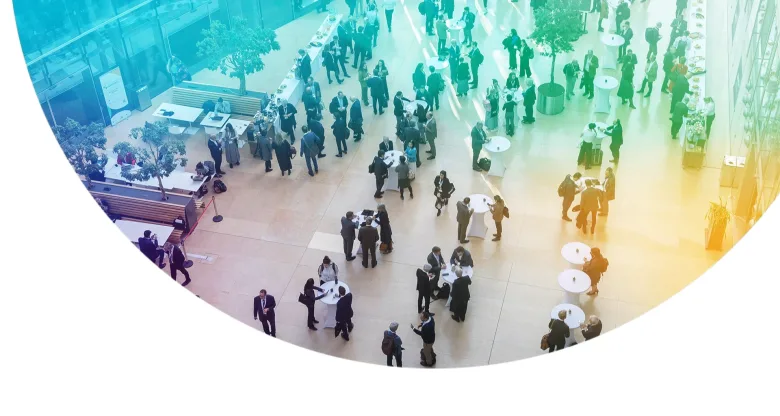The four main objectives were to:
- debate the yearly update of the GESDA Science Breakthrough Radar;
- introduce GESDA’s new Pipeline of Solution Ideas, which are prototypes of possible avenues of action that could accelerate the beneficial uses of emerging scientific and technological breakthroughs for humanity;
- gain a preliminary assessment by political authorities on whether and how these actions could be politically endorsed in a broad manner and, as a result, be set in motion at a global diplomatic level;
- start to set up innovative impact funding instruments that could provide the resources that would be needed to incubate these solution ideas.
In addition, a Public Plenary session focused on advances in genetic engineering and synthetic biology organised in partnership with the Geneva Graduate Institute.
Summit highlights
High-Level Political Segment
A new political element was introduced with an inaugural panel that included Swiss President Ignazio Cassis and ministers from Estonia, Mexico, Morocco, Singapore and the United Arab Emirates. It was moderated by Alexandre Fasel, Switzerland’s first Special Representative for Science Diplomacy. President Cassis pointed out that a Western assumption that the world is “automatically increasing towards democracy” no longer seems to be the case, with the rise of authoritarians and wars in Asia, the Middle East and now Europe telling a different story. He emphasised the need for citizens living in democracies to be willing and able to include all viewpoints in public debates, not just those from like-minded people, and “this is a topic where science, science diplomacy can help us to do the right thing.”
The Swiss President, Ignazio Cassis conveyed that his dream is for GESDA to become “a powerful tool in enabling a diverse world, through science, to make some steps together in a peaceful way,” and for science diplomacy to become the theme of the 21st century among Geneva’s hub of international organisations and multilateralism, much like human rights in the 20th century and international humanitarian law in the 19th century.
Opening High-Level Plenary
The summit opened with a demonstration of GESDA’s firm support from the Swiss and Geneva governments, including an explanation from Swiss President Ignazio Cassis about why the authorities extended GESDA’s mandate for 10 years after its successful three-year pilot phase. Speakers cited the need for multilateral governance in a world grappling with climate-linked droughts and flooding; widespread hunger; pandemics; armed conflicts in Europe and much of Asia and Africa; human rights abuses; inflation, and disrupted supply chains. As GESDA Board Chairman Peter Brabeck-Letmathe emphasised, GESDA has no time to waste.
GESDA Board Member Mamokgethi Phakeng, Vice-Chancellor of South Africa’s University of Cape Town (UCT), oversaw a new Youth and Anticipation Initiative as a partnership between UCT and GESDA to engage young people.
During a high-level panel on the topic of “The New Geopolitical Landscape for Science”, GESDA announced a new collaboration with the Geneva Centre for Security Policy (GCSP) and Columbia University that links emerging science to future challenges of peace, war and international security. This has materialised in the future of peace and war deep-dive discussed in this edition of the Science Breakthrough Radar.
The 2022 GESDA Science Breakthrough Radar
Presented during the Opening High-Level Plenary, GESDA’s flagship product involved 774 scientists from 73 countries, a 43 per cent increase in the number of scientists from last year’s inaugural edition. The number of emerging topics identified also rose to 37, up from 24. A fifth area of emerging sciences — Knowledge Foundations — was added to the four main areas in which the scientists anticipate developments.
GESDA’s Academic Forum has expanded its network of participating scientists because “we have to keep engaging with the scientific community,” said Martin Vetterli, President of the Swiss Federal Institute of Technology Lausanne (EPFL), who oversaw the forum’s development of the Radar for two-and-a-half years with Joël Mesot, President of the Swiss Federal Institute of Technology in Zurich (ETHZ).
Since the Radar affects everybody, Phakeng said, the new Youth and Anticipation Initiative will “get the voices of young people into the conversation”, helping to reduce inequalities. The Radar’s new philosophical and geopolitical lenses also include a “very necessary dialogue” involving social scientists, said Geneva Graduate Institute Director Marie-Laure Salles.
The GESDA Pipeline of Solution Ideas
GESDA presented a new tool for accelerating the conversion of solution ideas from the Radar and Summit into concrete actions. This year, those were a pair of proposals to create an Open Quantum Institute (OQI) in Geneva and the first Global Science and Diplomacy Curriculum. The purpose of the OQI — which drew lengthy discussion and was well-received — is to widen global access to quantum computers and develop use cases for quantum computing that could help accelerate the accomplishment of the UN’s 17 Sustainable Development Goals (SDGs) for 2030. The Global Science and Diplomacy Curriculum will help to train current and future science and diplomacy leaders to effectively tackle emerging global challenges through anticipatory science and diplomacy. It is being developed with a large number of partners.
The GESDA Youth Cohort
This year’s summit gained fresh perspective from 12 young people whose participation was based on the nominations and support of GESDA partner institutions, including South Africa’s University of Cape Town, Swissnex, Swiss Young Academy of Scientists, Villars Institute and XPRIZE Foundation. Among them were three participants chosen from the Youth and Anticipation Initiative led by Phakeng. Throughout the summit, these young people were invited to share their thoughts about what they heard, learned and reflected on during the sessions, and to share their views on the future of science and diplomacy and on GESDA’s efforts and vision.
During a panel discussion, several of the young and aspiring leaders, who are just setting out on their chosen educational and career paths, emphasised the need to sustain hard work and hope in the service of science anticipation. “We are constantly reminded that there is a lot that we are struggling to cope with as a society, as a world and as a species. There are a lot of challenges that we have to overcome,” said Jordan Naddaf, an American student at SOAS University of London. “I think that GESDA has left me very hopeful.”
In a keynote message, Phakeng congratulated all of the youths for their selection because it meant they are all working hard and doing things that are important for everyone to hear about. “You will inherit the world,” she told them. “And so it is important that you become part of the conversation and that you, as young people, become part of leading the action into a better future.”
Launch of the Impact Forum and Fund
With financing for international impact continuing to be a challenge, GESDA confirmed its ambition to launch an Impact Forum and related Impact Fund led by GESDA Board Vice-Chairman Patrick Aebischer, who is President-emeritus of EPFL. Their purpose is to provide the resources necessary to implement the most promising solutions and initiatives that use emerging science for the benefit of humanity.
The Forum and Fund aim to target the same global inequalities and nationalism that hampered recovery from the COVID-19 pandemic. In a keynote message, Aebischer noted that we are living through an incredible time of scientific disruption that is occurring at a pace never seen before. A new Impact Forum and Fund can help us respond better, break down inequalities and bring the scientific community to the table of multilateralism. “Everybody needs to be around the table, and that is what we have decided to do at GESDA,” he said. “We are going to rely on innovating new financing, which is going to be public-private by definition.”
This section provides a description of the sessions related to the scientific emerging topics discussed in the Science Breakthrough Radar 2022, as well as their main conclusions. They provide the basis for the concrete solutions and initiatives currently in the making in GESDA’s pipeline of Solution Ideas, that will be presented and discussed in more depth at the next GESDA Summit from 11–13 October 2023. The full summit proceedings, including programmes and speakers is available at: https://gesda.global/summit/



